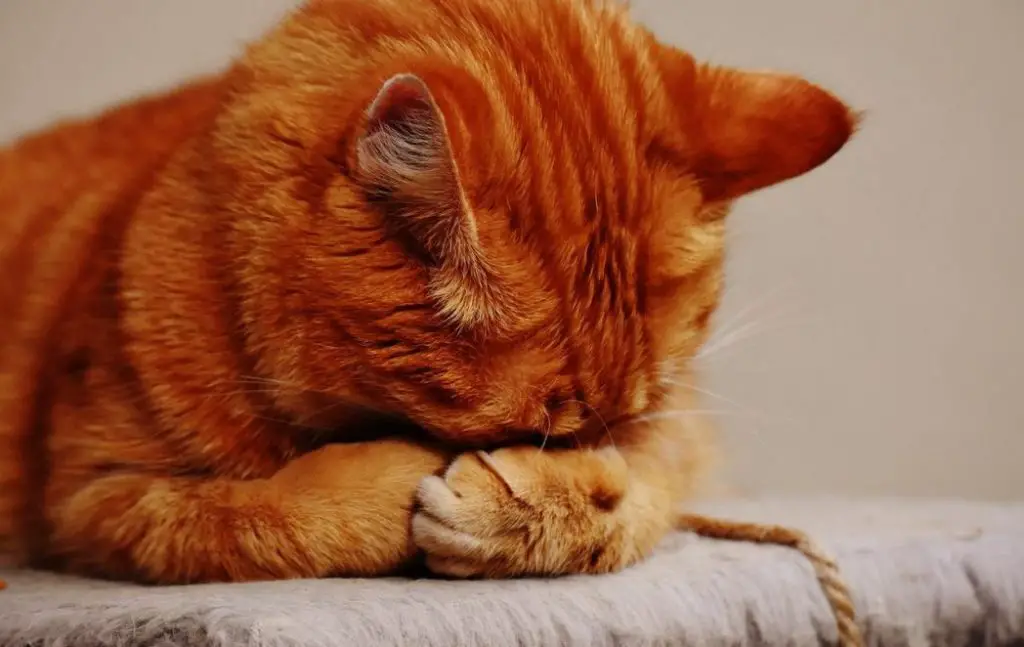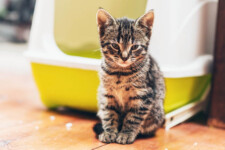Treatment for When Your Cat Has Diarrhea: What To Do
Although your cat might not be able to tell you how they feel, we can certainly say that they don’t enjoy a diarrhea episode.
Monitoring your cat will help you determine their actual health status. Frequent assessment of your cat’s litter can help to detect the early signs of cat diarrhea.
Sometimes even when your cat is showing diarrhea symptoms they seem to behave normally, are still active, and look fine.
So, is it a big problem – or could there be hidden dangers that are not immediately apparent?
Let’s take a look at general causes of diarrhea, the symptoms you are likely to see, and what you can do to treat the problem before it becomes more serious.

Unusual Toilet Habits
If you notice your cat visiting the litterbox more frequently than normal, it’s best to have a quick look to see if things look normal.
If you are using the Scoopfree Original Self Cleaning Litter Box, you can use the digital counter to see if there is something usual about your cat’s toilet habits.
Causes Of Cat Diarrhea
There are a number of reasons that could cause diarrhea in cats.
Food sensitivity and allergy, cancer, colitis, and toxins top the list of the causes of diarrhea in cats.
The common causes include:
Parasites
It is important to deworm your kitty every three months to eliminate parasites.
Parasites like roundworm and tapeworm cause irritation in the cat’s intestines leading to diarrhea. Young kittens are more vulnerable to worms than adult cats.
Check our article on how to rid your cat of worms
Dietary
Overeating, consuming very fatty food, diet change, eating spoiled food could lead to diarrhea.
Foods like lactose present in milk are not suitable for cat consumption, and it can cause diarrhea and other complications.
This cause can be managed by altering your cat’s diet to remove diarrhea-triggering diets.
When changing your cat’s diet, it is important to do it gradually in order to let their digestive system adjust to the diet change.
Infections
Diarrhea can be a sign of either a viral or bacterial infection.
Some viruses cause mild diarrhea while others result in life-threatening diseases. A young kitten is more affected by infectious agents.
Metabolic Diseases
Some diseases like intestinal tumors (frequent in older cats), pancreatic and liver disorders, as well as thyroid imbalances, affect the gastrointestinal tract, which leads to diarrhea.
Medication
It is important to consult your vet to find out the various type of medications that can cause diarrhea in cats.
Symptoms Of Cat Diarrhea
Symptoms of diarrhea in cats differ depending on the underlying cause and the intestinal area affected.
The duration and the type of onset of the symptoms determine the cause of diarrhea.
Symptoms that occur suddenly indicate that the diarrhea is acute.
Symptoms that last for weeks indicate that the diarrhea is chronic, while the ones that appear and disappear after a while are intermittent.
The most common symptoms of diarrhea include:
- A loose and frequent stool.
- Straining to poop.
- Weight loss.
- Blood in stool.
- Flatulence.
- Vomiting.
- Fever.
- Dehydration.
- Loss of appetite.
- Lethargy.
Blood in stool or black stools could be an indication of internal bleeding in the stomach and intestine. In such a case immediate medical care is required.
Treatment of Cat Diarrhea
The first thing you should do when you notice your cat has a diarrhea is to stop feeding them for 12-24 hours.
During this period, give the cat plenty of clean drinking water to prevent dehydration.
It is important to monitor your cat during this period.
If diarrhea does not subside after 24 hours, and you notice other symptoms, take your cat to the vet.
The vet will perform a number of tests to determine the cause of diarrhea and administer the necessary medication.
During the recovery period, it is important to pay attention to hygiene.
Make sure you wash your hands after handling your cat.
More Reading
- How Effective Is Prosense Dewormer? (Find Out)
- Bayer Drontal Cat Dewormer Reviewed (Buyer Guide)
- Best Limited Ingredient Cat Foods For Sensitive Stomachs
- Older Cat That Vomits Regularly? These Foods Can Help



